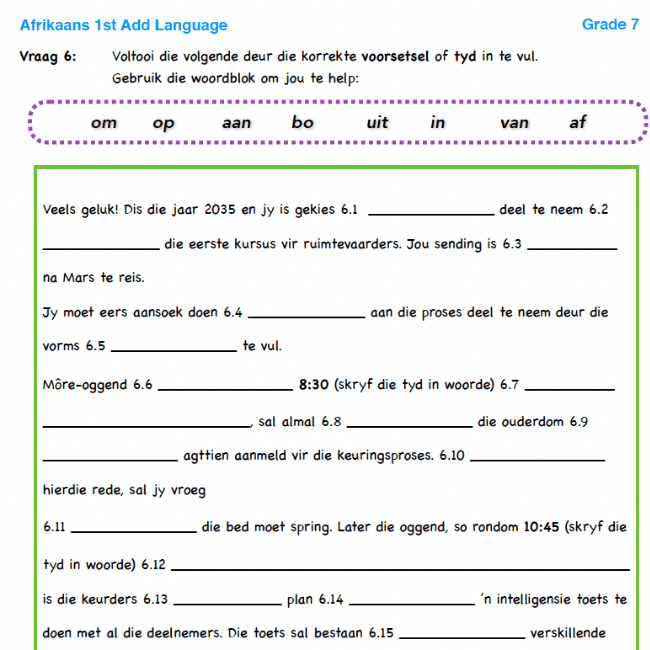
Afrikaans Past Exam Papers and Memos for Grade 7
Introduction
Afrikaans is one of the official languages of South Africa and is spoken by a significant portion of the population. As such, it is an important subject in the South African education system, and Grade 7 learners are required to take Afrikaans exams as part of their curriculum. Past exam papers and memos are invaluable resources for learners to prepare for these exams and improve their understanding of the language.
Benefits of Using Past Exam Papers and Memos
- Familiarization with Exam Format: Past exam papers provide learners with a clear understanding of the structure and format of the actual exam, including the types of questions and the time allocation.
- Identification of Key Concepts: By studying past exam papers, learners can identify the key concepts and topics that are frequently tested, allowing them to focus their revision efforts accordingly.
- Practice and Improvement: Solving past exam questions helps learners practice their skills and identify areas where they need improvement. The memos provide detailed explanations and solutions, enabling learners to understand the correct approach and avoid common mistakes.
- Time Management: Past exam papers allow learners to practice time management skills and develop strategies for completing the exam within the allotted time.
- Confidence Building: Successfully completing past exam papers can boost learners’ confidence and reduce anxiety before the actual exam.
Accessing Past Exam Papers and Memos
Past exam papers and memos for Afrikaans Grade 7 can be accessed from various sources, including:
- Department of Basic Education (DBE) Website: The DBE website provides a repository of past exam papers and memos for all subjects, including Afrikaans.
- Provincial Education Departments: Provincial education departments often have their own websites where they publish past exam papers and memos.
- Schools: Schools may have a collection of past exam papers and memos that they share with their learners.
- Private Tutors and Educational Resources: Private tutors and educational resources companies may offer past exam papers and memos as part of their services.
Tips for Using Past Exam Papers and Memos
- Start Early: Begin practicing with past exam papers well in advance of the actual exam to allow ample time for revision and improvement.
- Time Yourself: When solving past exam papers, time yourself to simulate the actual exam conditions and develop effective time management strategies.
- Analyze Your Answers: After completing a past exam paper, carefully review your answers and compare them to the memos. Identify areas where you made mistakes and focus on improving those concepts.
- Seek Help When Needed: If you encounter any difficulties or have questions about specific concepts, do not hesitate to seek help from your teacher, a tutor, or a classmate.
- Stay Positive: Remember that past exam papers are a valuable tool for preparation, but they should not be a source of stress. Approach them with a positive attitude and use them to improve your understanding and confidence.
Facts about South Africa
In addition to providing information about Afrikaans past exam papers and memos, this document also includes some interesting facts about South Africa:
- Official Languages: South Africa has 11 official languages, including Afrikaans, English, Zulu, Xhosa, and Sotho.
- Population: South Africa has a population of over 60 million people, making it the 24th most populous country in the world.
- Geography: South Africa is located at the southern tip of Africa and is bordered by Namibia, Botswana, Zimbabwe, Mozambique, Swaziland, and Lesotho.
- Natural Resources: South Africa is rich in natural resources, including gold, diamonds, platinum, and coal.
- History: South Africa has a complex and tumultuous history, including periods of colonialism, apartheid, and democracy.
- Culture: South Africa is a vibrant and diverse country with a rich cultural heritage that includes music, dance, art, and cuisine.
- Wildlife: South Africa is home to a wide variety of wildlife, including the “Big Five” (lions, elephants, leopards, rhinos, and buffaloes).
- Tourism: South Africa is a popular tourist destination, known for its stunning landscapes, wildlife, and cultural attractions.
- Economy: South Africa has the second-largest economy in Africa, with a strong mining, manufacturing, and tourism sector.
- Education: South Africa has a well-developed education system, with a high literacy rate and a number of prestigious universities.
